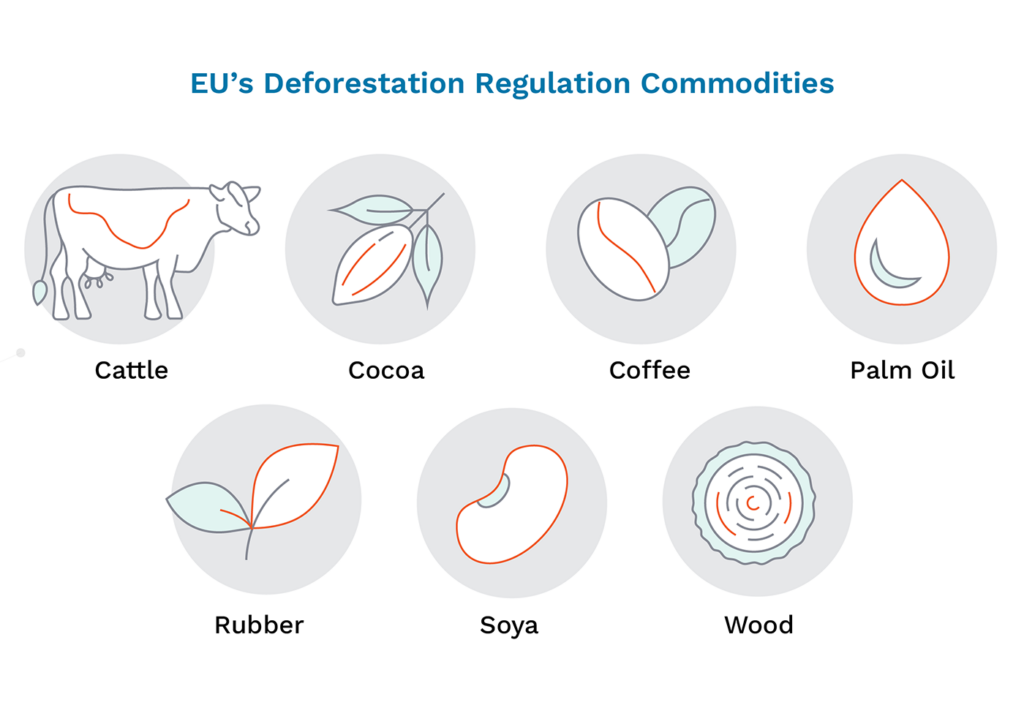The EU’s new Deforestation Regulation, or the EUDR, comes into full effect for all in-scope companies in June 2025, and its requirements are onerous. Companies may be unable to place certain commodities or products in the EU market if they can’t prove a deforestation-free provenance. And worse, non-compliance can lead to hefty fines, loss of participation in public procurement processes, and a loss in public funding.
But don’t miss the forest for the trees. While the EUDR requires much more rigorous due diligence operations than previous regulations, implementing these supply chain management processes early can benefit your organization greatly. Maintaining compliance to the EUDR will not only prevent fines and other obvious consequences, but also help your business prepare for future environmental, social, and governance legislations. And, incorporating strong due diligence processes across your business now will keep you ahead of competitors who may be scrambling to clean up their supply chain management strategies in just a few years.
EUDR Key Facts
The EUDR is the EU’s latest legal effort to encourage businesses operating within the EU to take accountability for and action against the deforestation and loss of biodiversity commonly associated with certain commodities. The regulation addresses companies that trade in or distribute cattle, cocoa, coffee, oil palm, rubber, soya, wood, and their associated commodities. Companies are required to assess and verify that these goods have not been produced as a result of recent deforestation, forest degradation, or violations of local laws. The EUDR defines ‘recent deforestation’ as deforestation or forest degradation that has occurred after December 31, 2020.

Figure 1: Seven commodity types with direct impact from EUDR
A broad range of businesses are included in the EUDR’s remit. Since the regulation is focused on the commodities and associated products, any company that places or distributes any of these within the European market must maintain compliance to the EUDR.
To maintain compliance, businesses must:
- Prove that the concerned commodities or derivative products are deforestation-free, as per the EU’s definition of recent deforestation and forest degradation.
- Prove that the concerned commodities or derivative products have been acquired or produced in accordance with any applicable local laws from which the commodity or product originates.
- Produce a thorough due diligence statement proving the inquiries above, and including a risk assessment that demonstrates no more than a negligible risk of non-compliance.
The EUDR has already been signed into effect and will be enforced for most companies starting on December 30, 2024. Companies that qualify as SMEs under the EUDR must be able to prove compliance by June 30, 2025.

Figure 2: EUDR timeline from initial pass to final deadline when the regulation takes full effect
How to leverage the EUDR for strategic advantage
The due diligence burden is much higher than current regulations within the EU, and businesses may be scrambling to prepare for its full enforcement. You don’t want to fall on the wrong side of the EUDR. Non-compliant businesses can face a fine of at least 4% of EU turnover from the preceding year, exclusion from public procurement processes and funding, and product and revenue requisitions. Plus, regular offenders may even face a temporary ban within the EU from trading with the specified commodities or products.
However, putting systems in place that will keep your business compliant with the EUDR can give your company so much more than a regulatory well done. Strengthening your company’s due diligence data gathering, assessment, and verification abilities now will help your organization prepare for other incoming supply chain regulations and, more generally, abnormal supply chain events.
